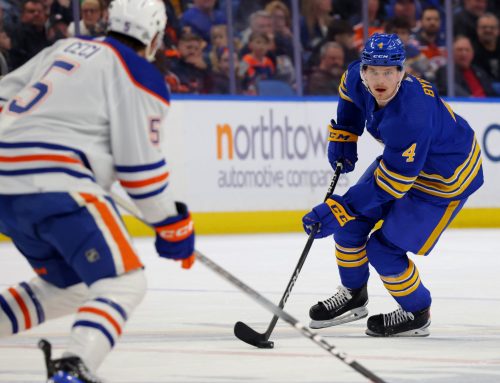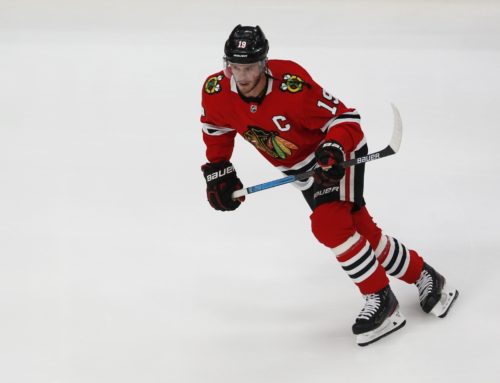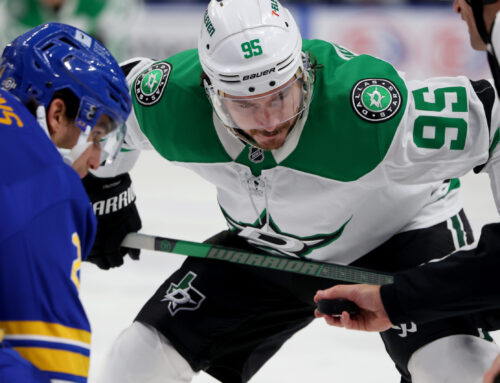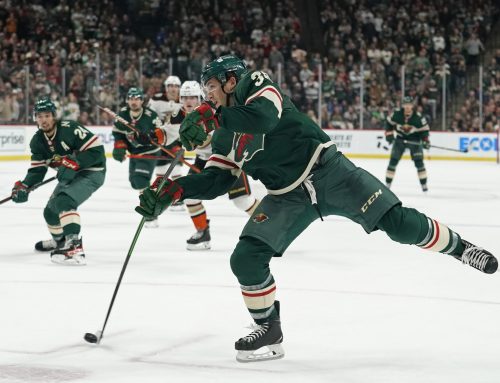I made a recent appearance on the Fantasy Hockey Hacks podcast. Give it a listen! We discussed a lot of fantasy hockey content, including some topics of the day and listener questions. As well, we rank and project top 10s for both centers and wingers. Always great chatting with Devon and Bruce.
I'll also be contributing to the Hacks' live show on Edmonton Sports Talk every few weeks. It's on every Wednesday at 9 PM MST. They've assembled solid list of fantasy hockey experts, including our Saturday Game Picks writer Flip Livingstone and Dobber Prospects writer/editor Victor Nuño.
–
Last week I wrote about three players that I recently added to my team through my slow auction draft. I've added a few more players, which I'll discuss today. These aren't necessarily players that I suggest you should draft. They're players that made sense for me, but I'm simply providing what I hope is an objective take.
I can't quit Kris Letang. I just can't. He's been on my keeper roster for over a decade and he'll be back again this season. Yep, I've experienced the highs of some outstanding seasons (two 65+ point seasons) and the lows of a stroke and countless injuries. In fact, he's the only player I have left from my original team when I first joined the league in 2010, so I felt a certain sense of loyalty in bringing him back. Because he was on my team last season, I was able to match any bid for him, and I was able to acquire him for half the auction cost I paid for him previously. That aligns with his ADP in single-season leagues, which is as low as it has been for quite a while (122 ADP in Yahoo, 93 ADP in Fantrax).
There are several reasons that Letang's stock is down, but the reason that jumps out the most is the offseason addition of Erik Karlsson. Even if Letang can squeeze onto the first-unit power play, EK65 and Brent Burns tended to cannibalize each other's point totals when both were in San Jose. Letang is now also 36 years old, which made it surprising that the Penguins signed him to a six-year contract last offseason. This is a contract that is set to expire in 2028, when Letang will be 41 years old! Letang's production also dipped to 41 points in 64 games, his lowest point-per-game average (0.64 PTS/GP) in nearly a decade.
Regarding that first power play… I'm happy to report this recent bit of good news.
In fact, I'm going out on a limb to predict that more teams will be using three forwards and two defensemen on their first power play than was the case last season. Teams are prioritizing puck-moving defensemen, which is why you're seeing more offense from the defense than in years past – even with overall scoring inflation.
Back to Letang. I didn't think he would last as long as he has, considering his lengthy history as a Certified Band-Aid Boy. In my league, I have the option of signing players for up to five years (although the number of 3, 4, and 5-year contracts are limited). Since 2017, I wouldn't sign Letang to more than a two-year deal, concerned that injuries might grind his career to a halt. Like his new teammate Karlsson, Letang has found a way to overcome some serious injury challenges. Letang might only be a 45-55-point-pace player going forward (minus games missed due to injury), but there's still room for him on fantasy teams that roster 4+ defensemen.
By the way, I don't plan to start a podcast (I had one years ago when I wrote for another fantasy hockey website). But if I did, I think I'd call it Keeping Kris.
–
Mike Matheson led all Montreal defensemen with 34 points while playing in just 48 games. That's because only one Canadiens blueliner (Johnathan Kovacevic) played in at least 70 games. Matheson was able to take full advantage of his opportunity because of all the injuries and inexperience, averaging nearly six minutes per game more than he did in his previous season in Pittsburgh. In addition, he received first-unit power-play minutes for the first time in his career with Montreal in 2022-23 – a skill that some thought he had, but he never really had an opportunity to demonstrate at the NHL level.
How long that continues for Matheson remains to be seen. The Habs have youthful options that are waiting in the wings, including Justin Barron, Kaiden Guhle, and eventually Lane Hutson. That's why I've invested very short term in Matheson. Signed for three more seasons, Matheson should be an important blueliner for the Habs as they continue their rebuild. Yet it would be easy for him to revert to a more defensive role should those other options demonstrate they are ready to take on a significant offensive role on the team.
–
I mentioned Dmitry Orlov in Bubble Keeper Week as a defenseman that automatically went to free agency in my league – a list that also included Matheson, Jared Spurgeon, and Filip Hronek. Sure enough, I placed bids on all these defensemen and only the Orlov bid went unmatched. (When you hear those crickets, you sort of wonder if this is a player you should have bid on in the first place.) My league mates must have been reading my writing (I know one or two do), since I mentioned that I would be "less inclined" to bid on Orlov than the others because I don't expect him to receive a lot of power-play time in Carolina.
Orlov was actually on pace for 45 points last season, as his career high of 36 points was over just 66 games. He managed to explode offensively after being traded to the Bruins at the deadline, scoring 17 points in just 23 games. This was a Bruins team that was firing on all cylinders and he managed to get in on the fun. Only four of those 17 points were on the power play, where Orlov mainly played on the second unit. There is some offensive ability there, although Orlov shouldn't be used in nearly as many offensive situations as Brent Burns and Tony DeAngelo in Carolina. For five of the past six seasons, Orlov has received sub-50% offensive zone starts.
Dobber's projection of 38 points for Orlov seems generous, although if you follow the money, he is now Carolina's highest-paid defenseman and by a significant margin. That being said, consider Orlov a depth defenseman in leagues that use more than four defensemen (like mine does).
Another interesting fact I learned when I was researching this: The Hurricanes don't have a defenseman on the NHL roster signed for more than two seasons. Talk about keeping your options flexible.
–
Recently named captain of the Blues, Brayden Schenn doesn't seem to grab a lot of attention in fantasy leagues, and I really don't have a ton to say about him. Yet he's a remarkably consistent player that can be counted on for at least 50 points and 100 hits. Schenn has reached a 50-point pace in each of his last eight seasons, while he has delivered at least 100 hits in each of the last 12 seasons.
Unfortunately, my league doesn't count hits, so I'll need to count on Schenn for his scoring. He's reached 20 goals seven different times, and manages to do so while averaging around two shots per game. One concern is that his offensive zone starts have been below 50% over the last three seasons, which might be a result of the offense declining on the Blues. At age 32, Schenn's offensive upside is fairly limited compared to what we have seen. Yet he's a relatively inexpensive option that you could add to your lineup and rarely have to think about.
–
I'm not enamored with adding James Reimer and kind of second guessed the bid after I made it, but I'm leaning hard into Zero G in this league. My top three goalies are Ville Husso, Pheonix Copley, and Anton Forsberg, so it made some sense to have Husso's backup or replacement available where I can stash him. I placed a single bid on Reimer and no one countered, so there was no interest. (Again, should I have even bothered?)
Reimer actually had a bit of a bidding war last season when he was the timeshare goalie for the Sharks. At least he's going to a better team, although he may not start as often. He's played at least 30 games in a season 11 times in his career, but only played more than 45 games once. This is not necessarily about recommending Reimer specifically, but more to think about how to value goalies. Potential starters like Mackenzie Blackwood and Petr Mrazek are still available, but I can't take that chance with them. I lose points for goals against and losses, and there could be a lot of both for Blackwood and Mrazek this season given the teams they play for.
Lastly, why Zero G? First, the league is head-to-head, but instead of winning more categories than your opponent for the week, you simply have to earn more league points than they do. Second, only two of the 16 active roster spots in this league are used for goalies (20 total with no more than three goalies allowed), which means I concentrate more on gaining points from the other positions and simply try to minimize the damage at the goalie position. Finally, with scoring on the rise in the NHL, goalies were becoming more likely to be a drain on total points. If the goalie has a bad start (or a Really Bad Start), it results in negative points. Obviously there’s an advantage to having a strong goalie, but I’m not “punting” a category by de-emphasizing goaltending. You can hear more of my thoughts on Zero G in the above Fantasy Hockey Hacks podcast (go to about the 20 minute mark, although you get to hear me talk about Zero D first).
–
Rest in peace Nic Kerdiles.
–





 CHI
CHI SEA
SEA FLA
FLA DAL
DAL WPG
WPG CBJ
CBJ L.A
L.A MIN
MIN DET
DET NYI
NYI
